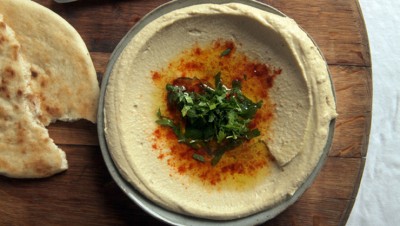
According to Sephardic custom, a food that is ground into a jelly or paste retains its original Bracha. Even though the resulting food does not outwardly resemble the original food and has a different texture, nevertheless, it retains the original Bracha since it is, after all, the same food, only in a different form. This is the ruling of Chacham Ovadia Yosef, and of Rabbi Moshe Halevi in his work Birkat Hashem. A common application of this principle is Tehina, which is ground sesame seeds, to which ingredients such as oil, lemon juice and spices are generally added. If a person eats Tehina by itself (and not as a condiment with other foods), he recites the Bracha of “Boreh Peri Ha’adama,” since he essentially eats sesame seeds, which grow from the ground. Similarly, if a person eats Humus by itself, he would recite “Boreh Peri Ha’adama,” since Humus is simply ground chickpeas, and it therefore requires the Bracha of “Ha’adama” just like chickpeas eaten in their original form. This Halacha does not, however, apply to Halava, which is made from ground sesame seeds that are then mixed with sugar and other sweetening agents. Unlike in the cases of Tehina and Humus, when Halava is produced the ground sesame seeds are reconstituted into a new kind of paste. The Halava is not simply ground sesame, but a different food made from ground sesame. Therefore, it “loses” its original Bracha of “Ha’adama,” and it instead requires the Bracha of “She’hakol Niheya Bi’dbaro.”
Summary: One who eats Tehina or Humus by itself recites “Boreh Peri Ha’adama.” One who eats Halava recites the Bracha of “She’hakol Niheya Bi’dbaro.”
By Rabbi Eli Mansour
The Proper Beracha to Recite Over Tehina, Humus and Halava
Typography
- Smaller Small Medium Big Bigger
- Default Helvetica Segoe Georgia Times
- Reading Mode

